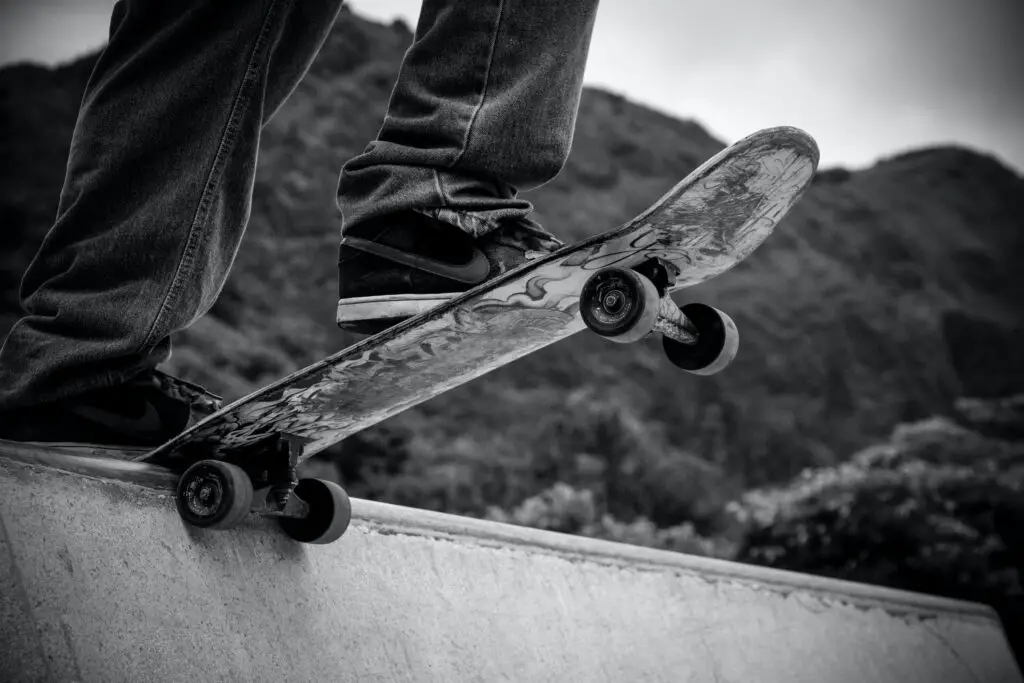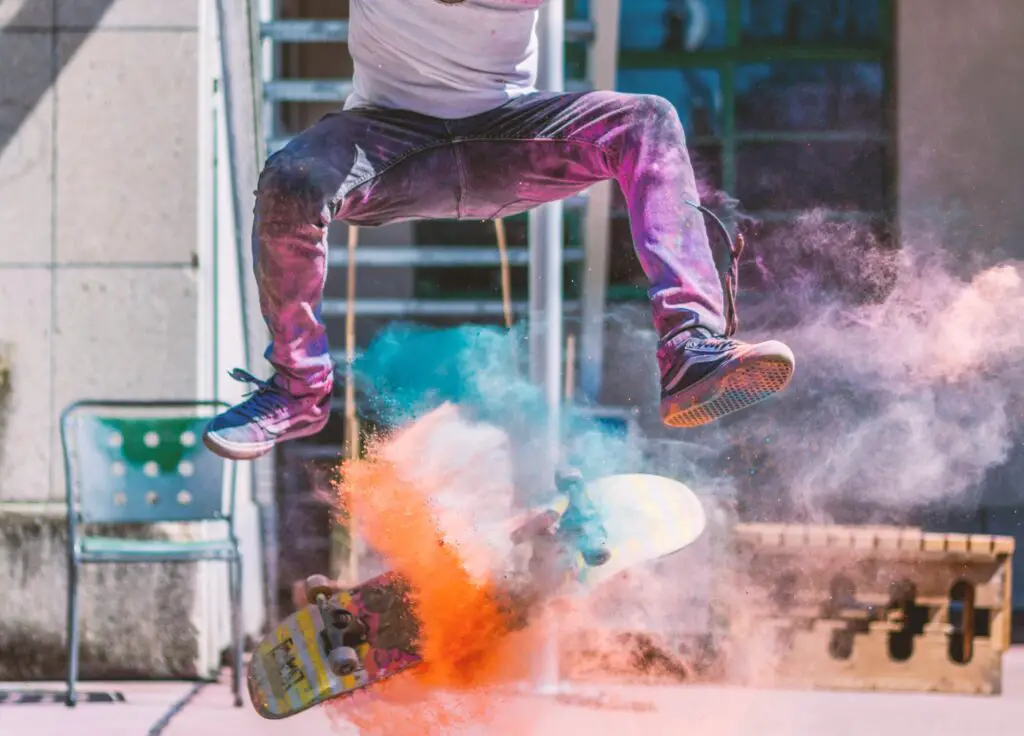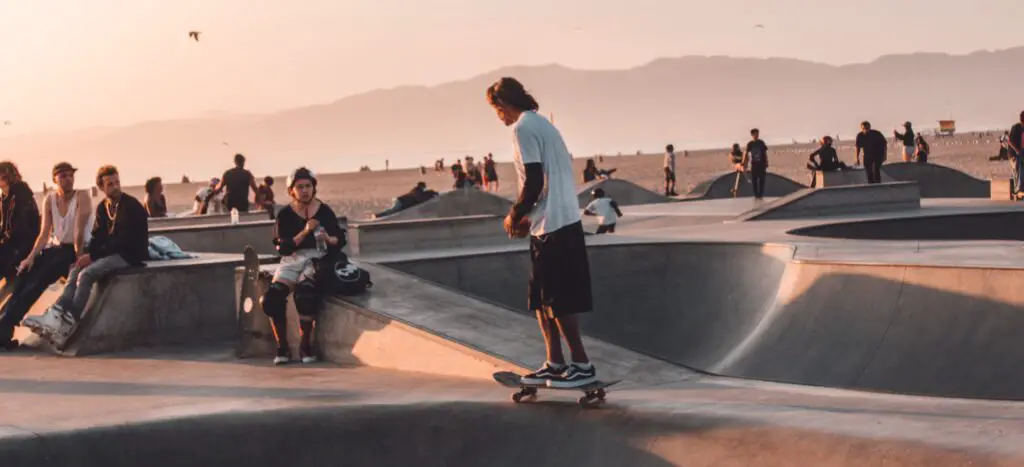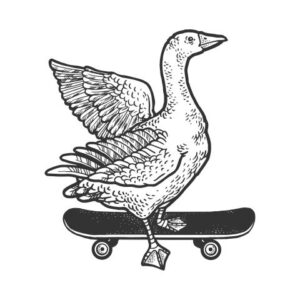Skateboarding is primarily viewed as a physical sport, but there are many unseen aspects of the sport that go beyond the physical. These include mental and social aspects of the sport that help many kids and adults who take up the sport.
So what are these benefits?
Let’s dive into it.
9 Mental and Social Benefits of Skateboarding
1. Sense of Community
Skateboarding invites a sense of community that you find in other team sports.
When you spend time with other skaters, you will see them fall, bleed, sweat, and curse as they learn new tricks. You will see their worst moments and will see them eventually triumph and land something they struggled with.
There is no pretense in skating and no one can keep up appearances while they slam into the pavement. This causes the relationships you have with other skateboarders to be a bit more genuine than in other areas of life.
Skateboarding isn’t really about appearance and social status. If you want to impress someone, then there are much better ways to do it than skateboarding. This is something I love about the skateboarding community. It doesn’t operate like other aspects of life. Skaters respect effort and grittiness. Appearances, wealth, and everything else are left at the door.
2. Learn to Overcome Fear
Skateboarding is kind of scary. To drop into a bowl, you need to basically fall shoulder first into a 5-feet or more drop towards the concrete.
To do an ollie while moving, you need to jump straight up with a board on wheels under you while not turning your body in anticipation of a fall. This is not easy. Your body sends signals of fear to your brain with good reason. These are dangerous things to do.
You can watch any street skating video and see stunts that would make the average person sweat. Skateboarding requires you to overcome feelings of fear. Otherwise, you will not progress.
Being able to face fear and still commit to action is an amazingly valuable skill to have. This overlaps in so many areas of life that it is mind-boggling. If you can drop in or ollie that stair set, then you feel like you can do anything.
Why did you even think starting that business or asking that person out was scary?

3. Learn to Push Past Pain
Falling on concrete hurts. Falling on concrete from the top of a bowl or from the top of a stair set hurts even more.
While you skateboard and learning new tricks, you are going to fall and hurt yourself. This is somewhat inevitable even with safety precautions.
That being said if scraping your knee was enough to stop skateboarders from skating then the sport would be dead. Learning to skateboard requires you to push past the pain of falling and continue to try to land a trick. This is a good skill to learn.
Many things in this life will require physical discomfort. It might be from just exercising or the stomach-churning, intense anxiety from standing on a stage, but being able to push past the pain in your body is a useful skill to have.
So don’t worry about your cutup arm. It will heal and is helping you grow mentally stronger.
4. Mediation Like Focus
When you are skateboarding you are focusing on the trick. If you don’t focus on what you are doing, you will mess up and fall. Within this sense of immediacy lies one of skateboarding’s greatest aspects.
Skateboarding is a form of mediation. Rodney Mullen speaks about this often and you find him discussing this in interviews available on YouTube.
Meditation is shown to reduce stress, increase self-awareness, and increase the development towards self-actualization. Self-actualization is a physiological term from the Humanist psychologist Maslow. It basically means fulfilling your potential.
The link between skateboarding and self-actualization is just speculation at this point, but so many musicians, actors, and other creatives skateboard. The link between skateboarding and music, fashion, and art is uncanny. I really hope someone does more research into this because I think the idea is so cool.
So go skate. It might help you unlock your creative potential or at least help you be more present.
5. Creative Expression
Creativity and skateboarding go together.
So many musicians, graphic designers, actors, and other creatives skateboard that it can’t be a coincidence. You can express yourself skateboarding by your style of dress, your board’s artwork, your style of skating, and through video parts.
There is also a huge amount of freedom in the expectations of other skaters. Creative expression and trying new things are so accepted in this community that it is kind of crazy. Look at how skateboarding has influenced music, fashion, movies, and even gaming.
Through skateboarding, you are free to creatively dress, act, skate, and really form your own little culture bubble. Because skateboarding is viewed as something on the fringe of society there are few outside pressures to act in any way. Skateboarding in itself is rebellious.

6. Sense of Freedom
How often do you feel a sense of freedom in your everyday life?
Maybe you do when you’re home alone and there’s no one to judge you. Yet, for so many people, they never feel that freedom.
We’re stuck in jobs that we have to have to pay bills. We have to act in acceptable ways at dinner parties or we need to be available and responsible for our significant other or our kids.
Children and teenagers feel the same lack of freedom with school, parental rules, and social expectations.
And through skateboarding, people find a sense of freedom. They find a community that accepts them and doesn’t expect certain behavior and values different qualities than normal society. They find a way to express their individuality with how they dress, the board design they choose, and how they skate.
Skateboarding really becomes this personal culture bubble that you have full control over. There are no expectations and the outside influences are weak as skateboarding is viewed as an outsider activity.
This sense of freedom and modicum of control works wonders in the lives of people. This is why skateboarding is so meaningful to so many people.
The beauty of skating is that everybody has a unique set of variables that they can put in place and express their individual identity in the form of – call it – greatness.
-Rodney Mullen
7. Increased Coordination
The amount of physicality and dexterity needed to perform even the most basic skateboard tricks is amazing. Even a simple ollie is such a complex set of movements and precise timings. On top of all this, skateboarders are performing these tricks by coordinating their feet, hips, and shoulders in fluid motions.
Skateboarding requires a level of precision we might associate with fencing or ballet. This means that a skateboarder will either learn to control his or her motions with exactness or forever be unable to kickflip. Which is, for all intents and purposes, a fate worse than death.
All this time spend learning precise movements won’t be lost in other areas of life. Body control has benefits in everyday life, other sports, and art forms as well.
8. Spending Time Outside
Spending time outside is linked to reduced stress and increased health in adults.
Skating is something that is done primarily outdoors. There are some indoor skateparks and sometimes people skate in their garages, but for the most part, skating happens in the streets and parks.
So often we spend all of our time indoors at our jobs and then later at home watching TV or inside a bar or restaurant. Many kids are glued to their phones and live idle lifestyles. How much time do you spend outside each week?
Research shows the connection between time spent outside each week and well-being and stress levels. There is little to no research about the correlation of skateboarding with stress, but I would be interested in what it would say.
One thing is for sure though, skateboarding happens outside, and being outside is good for your health.

9. Learning Perseverance
Skateboarding is hard. Really hard.
The amount of sweat, pain and failure you have to push through to learn even the most basic tricks is pretty crazy to think about. Additionally, it really takes months to learn the basics and then years to become decent at the sport. You never run out of challenging tricks or spots to skate.
To even learn an ollie can take over a month and then maybe another 2-3 months to learn it well. This instills a sense of “battling” a trick or battling a spot that skaters often talk about.
To say the least, this teaches skaters something important. It teaches them that perseverance is necessary to have success and to get what you want.
The level of difficulty and effort you need to succeed at skating is so much more than playing a videogame or studying for a test. It really teaches you how far you are willing to go for something you want and you can take the confidence from this lesson to other areas of your life.
Conclusion
So there it is. The list of benefits is from what I’ve personally experienced and understand. There are more out there especially considered I focused on social and mental benefits more than the physical benefits.
Either way, thanks for reading, and look out for more content from Board and Wheels.



